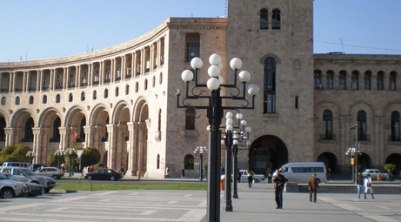Armenia`s stance hampers solution on Nagorno-Karabakh

Armenia, which has occupied 20 percent of Azerbaijan`s territory, including Nagorno-Karabakh and seven surrounding regions, since a brutal war in the early 1990s that displaced about a million Azerbaijanis, is unwilling to settle the conflict peacefully.
Armenia demands independence of Nagorno-Karabakh and refuses to withdraw its troops from the occupied territories, while Azerbaijan insists on upholding its territorial integrity.
The presence of Armenian troops in Nagorno-Karabakh is the main obstacle to the peace negotiations.
The OSCE Minsk Group has been brokering peace talks over the Nagorno-Karabakh conflict since a fragile ceasefire was signed in 1994, but its efforts haven`t produced any result yet.
During this year the co-chairs of the Minsk Group representing Russia, France and the U.S. have visited the region several times and held talks with officials in Azerbaijan and Armenia. Besides, the co-chairs participated in meetings of the Azerbaijani and Armenian foreign ministers.
The Minsk Group stepped up efforts only at the end of the year. At the OSCE ministerial in Dublin earlier in December, the co-chairs issued a joint statement calling upon the parties to the long-standing dispute to demonstrate the political will needed to reach a peaceful settlement.
However, despite all the efforts, they couldn`t make headway or even a positive change in the settlement of the conflict.
The Azerbaijani President and other senior officials as well as senior officials of other countries have expressed their concern over the delayed conflict resolution process, with some of them proposing to make substantial changes in the format of the mediating Minsk Group.
Recently, deputy chairman of the ruling Yeni (New) Azerbaijan Party Ali Ahmadov said that the Minsk Group`s work on the Karabakh conflict cannot be considered positive. He reminded that the Minsk Group has been working on the issue for about 20 years, but is failing to achieve its goals.
Concerned over the delay in peace talks, influential international organizations urge the sides to expedite reaching a solution to the dispute, which delays regional development.
The EU, which is not directly involved in the conflict resolution, has repeatedly stated that the status quo is unacceptable and supports diplomatic settlement of the conflict within the framework of the Minsk Group.
The Organization of Islamic Cooperation (OIC), which always condemns the hostile policy of Armenia and the occupation of Azerbaijani lands, keeps the unsettled Nagorno-Karabakh problem in its focus.
However, despite the concerns and efforts of foreign governments and states Armenia doesn`t give up its non-constructive position.
Armenia has not yet implemented the U.N. Security Council`s four binding resolutions on its pullout from Nagorno-Karabakh and the surrounding regions.
Thus, in September, Armenia said it was launching the airport in Khankandi -- the center of the self-proclaimed Nagorno-Karabakh republic run by ethnic Armenians in the occupied Azerbaijani territories.
Armenia also said it plans to commission Khojaly airport, although the commissioning of airports in Nagorno-Karabakh would be an open violation of international law.
The International Civil Aviation Organization (ICAO) and the European Civil Aviation Conference (ICAC) supported Baku`s stance on the issue.
The OSCE also criticized the attempts of Armenia, saying they will lead to further heightening of "the atmosphere of mistrust."
The delay in peace talks aggravates the situation on the Azerbaijani-Armenian border. According to the Azerbaijani Defense Minister, the ceasefire between Azerbaijan and Armenia was violated 1,370 times from January to November this year.
In this period two soldiers of the Azerbaijani army were captured by Armenian armed forces, 22 soldiers and one civilian injured and 16 servicemen killed as a result of ceasefire violations and mine blasts.
Moreover, the stalemate in the negotiation process and Armenia`s hardline position in the conflict hinders the implementation of energy projects in the region.
Indeed, the unresolved status of the conflict is first of all detrimental to Armenia, which is experiencing an increase in the poverty rate and a tough demographic situation.
However, Armenia, which is preparing to hold presidential elections early next year, apparently does not have any intention to change the situation even for the sake of its own people.
Azerbaijan has repeatedly stated that it can resolve the problem both by military action and diplomatic means, but it gives priority to a negotiated settlement.
Nevertheless, the international community is failing to take a decisive stance that would pave the way for lasting peace and security in the volatile region.
By Sara Rajabova















































